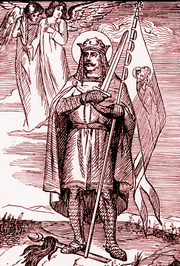Lives of the Saints
Our Models and Protectors
Spiritual Bouquet:
June 27

Saint Ladislas I
King of Hungary
(1031-1095)
Ladislas I was the grandson of the cousin of Saint Stephen of Hungary and the second son of his father, King Bela. It was only with sadness that as a young man he had seen his father ascend the throne, since it was by a war against his father's own brother that he did so. Bela's virtuous son would gladly have escaped the honors of royalty, but his cousin Solomon, legitimate heir, was cruel and had been driven out by Ladislas' older brother, Geiza, who after taking his place had reigned for only three years before his death. The people of Hungary knew of Ladislas's bravery in combat, his chastity, and his sobriety, above all his charity; everywhere the poor were showing the clothing and the silver he had given them from his own house. He knew many of them by name, and they had named him the pious Prince, for he had built magnificent Christian churches in a land where many still honored the pagan idols. It was with joy that the people chose Ladislas to replace his brother as King of Hungary.
He soon showed himself to be a perfect Christian king by the moderation of his judgments, his affability in receiving even the least of his vassals, his fatherly kindness to all. He restored the good laws and discipline which Saint Stephen had established, and which seem to have been obliterated by the confusion of the times. Chastity, meekness, gravity, charity, and piety were from his infancy the distinguishing traits of his character. Avarice and ambition were his sovereign aversion, so perfectly had the maxims of the Gospel extinguished in him all propensity to those base passions. His life in the palace continued to be very austere; he was very frugal and mortified personally, but very liberal to the Church and the poor. Vanity, pleasure, or idle amusements had no share in his actions or time, because all his moments were consecrated to the exercises of religion and the duties of his station. He had only the divine will in view, and always sought God's greater honor. Generous and merciful to his enemies, he was vigorous in the defense of his country and the Church.
During his reign his kingdom was attacked by numerous neighboring peoples. Before going out to repulse them he always commanded public prayers and a fast of three days, then at the head of his armies fought and was invariably victorious with the help of God, whom he did not cease to implore. He was preparing to depart, at the request of the princes of France, Spain and England, as General-in-chief of the 300,000 recruits of the great first crusade of the Christians against the Saracens for the recovery of the Holy Land, when God called him to Himself, on July 30, 1095, at the age of fifty-four years. Miracles were numerous at his tomb, and he was canonized one hundred years later, in 1199. The same day a small child born without hands and feet was cured by the invocation of Saint Ladislas.
Reflection. The Saints filled all their moments with good works and admirable actions; and while they labored for an immortal crown, the peace of Christ, the greatest share of worldly happiness of which this life is capable, was given them without their having sought it. In their afflictions virtue afforded them the most solid comfort, pointed out the remedy, and converted their tribulations into great advantages.
Les Petits Bollandistes: Vies des Saints, by Msgr. Paul Guérin (Bloud et Barral: Paris, 1882), Vol. 7; Little Pictorial Lives of the Saints, a compilation based on Butler's Lives of the Saints, and other sources by John Gilmary Shea (Benziger Brothers: New York, 1894)